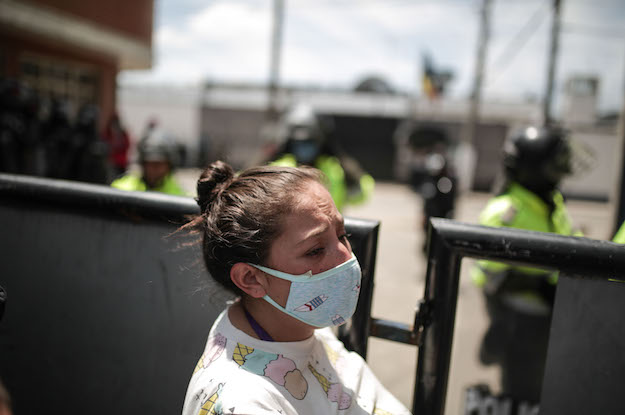The relationship between catastrophes and organized crime is not straightforward, but past disasters can offer some clues. Especially in contexts marked by high levels of corruption, criminal groups reportedly have exploited crises to carry out extortion, embezzlement, diversion of aid, and other activities.
There are limitations, however, to comparisons drawn between the present pandemic and previous disasters. First, the pandemic is a continuous rather than one-time event; according to experts, the virus is likely to come in waves. At first, criminal groups may — like legal organizations — find themselves at a standstill, with incurring losses. Yet, as time passes, many are likely to adapt – and survive. Evidence is already emerging of changing tactics. According to Interpol, police forces around the world have seized counterfeit medical items such as substandard protective masks, so-called corona spray, corona medicine and substandard hand sanitizer.
It is possible, nonetheless, to draw some lessons from past outbreaks of infectious diseases. The Ebola epidemic in West Africa (2013–2016), for example, had mixed impacts on organized crime. At least initially, the risk of infection and greater border controls caused trafficking routes through the region to slow down; some were altogether interrupted. At the same time, some key initiatives to combat organized crime in West Africa, including important international efforts, were also halted, creating new opportunities for trafficking, theft and other criminal activities. In addition, there were concerns that the increase in the number of orphaned children opened up new opportunities for human trafficking groups. Finally, organized crime may also benefit from inadequate recovery planning.
What could happen now?
The scale of the novel coronavirus is far greater than the Ebola outbreak, with a truly global reach, infecting people in 208 countries and territories as of April 6. With billions of people essentially stuck at home, the pandemic is likely to lead to a massive restructuring of organized crime, impacting markets for illegal drugs, arms and other goods.
While data is still too scant to draw conclusions about the impact of the coronavirus on organized crime, here are some key areas to watch:
1. Economic Adaptation
Given that so many people are house-bound, many legitimate businesses, whether legal or illegal, are turning more often to delivery services and social networks. The pandemic has already caused losses in revenues for Mexican criminal groups working with contraband imported from China. To what extent are these groups resorting to delivery of drugs, arms and other items to make up for losses? Will more groups diversify their portfolios, for instance, by taking on new activities, like cybercrime or the sales of medical products? And how do restrictions on the movement of people within specific countries affect their ability to continue their activities?
2. Internationalization
In South America, as an example, the São Paulo-based Primeiro Comando da Capital (PCC) has expanded into Paraguay in recent years. How will criminal organizations that cross such boundaries manage their internationalization in a “closed” world? To what extent are resources devoted to combating transnational organized crime being channeled into pandemic efforts?
3. Criminal Governance
In Latin America and the Caribbean, criminal groups sometimes maintain control of territories through a combination of coercion and the provision of basic goods and services, even drinking water, food and leisure activities. How does the pandemic impact the reach and dynamics of criminal governance, especially in areas marked by high poverty and hunger? Media reports from Brazil show drug trafficking groups imposing curfews on favela residents when the government was viewed as poorly enforcing lockdown. And if there is a further retraction in the presence of the state in these areas, will criminal organizations expand further? How will the state regain control after the crisis?
4. Prison Systems
In many parts of Latin America, prisons are at the heart of the recruitment process of criminal organizations. The virus has already begun to spread through prisons in Colombia, sparking protests and rebellions. The crisis has also slowed down parts of the justice system. Will those groups become even more important inside prisons as relatives are no longer allowed to visit prisoners? How will the release of prisoners (or mass escapes) affect those organizations — not only within the system, but also in the streets?
5. Women and Youth
The role of women and youth in organized crime in Latin America and the Caribbean is still poorly understood, but recent research shows that they play multiple roles, directly and indirectly, from the transport of drugs to recruitment. Will the steep rise in unemployment and the closure of schools and leisure centers lead more of them to join those organizations?
6. Corruption
The sudden redirecting of public resources may create new opportunities for corruption, both by state and non-state actors. Will organized crime find new spaces to act in the grey areas of response and recovery to the pandemic? Will resources be diverted, and if so, toward which types of activities?
7. Cybercrime
The pandemic has led to a surge in the frequent use of the internet as more people work and study from home and use social networks to communicate with friends, family and colleagues. There are early indications that criminal organizations acting in cyberspace are taking advantage of the rapid policy changes to launch scams, disseminate viruses and carry out other attacks, for instance via fraudulent coronavirus-related websites. Will new criminal groups form, and will established ones acting in cyberspace resort to new tactics?
8. Environmental crime
The past decade has brought a surge in environmental crimes, including those leading to vast deforestation in the Amazon basin. Criminal organizations specializing in illegal logging, illegal mining and the trafficking of wildlife species are behind much of this. How will the pandemic affect these criminal organizations, whether in the Amazon or elsewhere in the region? Will the rise in the price of gold lead to more invasions of protected lands by illegal miners?
9. Coercion of Migrants
Most Latin American and Caribbean states have closed borders, and in some cases have reinforced border patrols. While these closures have arguably stemmed the movement of refugees, migrant populations find themselves more vulnerable than ever. Will the region see an uptick in human trafficking, sexual exploitation, and the coercion of migrants into slave labor, especially in border regions?
10. Responses to organized crime
As governments, international organizations, civil society and private sector actors scramble to respond to the pandemic, there is a risk that current policies and practices to curb organized crime will be weakened, or that they will quickly become outdated. More broadly, non-pandemic related aid to the poorest countries, such as Haiti, may be cut, and state capacity in general across the region may be weakened. Organized crime is suddenly not among the top priority of states and other key actors. Will response and recovery efforts incorporate initiatives to prevent and dismantle organized crime? How will transnational efforts be resumed or updated?
–
Across all these areas, it is too soon to jump to conclusions. The pandemic is still in full swing, and not only states, but all other actors — and more broadly, the population — are only starting to adapt to the changing circumstances. However, researchers and analysts should keep an eye on the changing behavior of criminal organizations, not only locally but also at the transnational level. Comparative and collaborative research will be necessary to clarify the impacts of the pandemic on organized crime, so as to inform policymakers in the decision-making process.
—
Erthal Abdenur (Brazil) and Sampó (Argentina) are policy experts and coordinators at Amassuru, a network of Latin American and Caribbean women working in security and defense.







